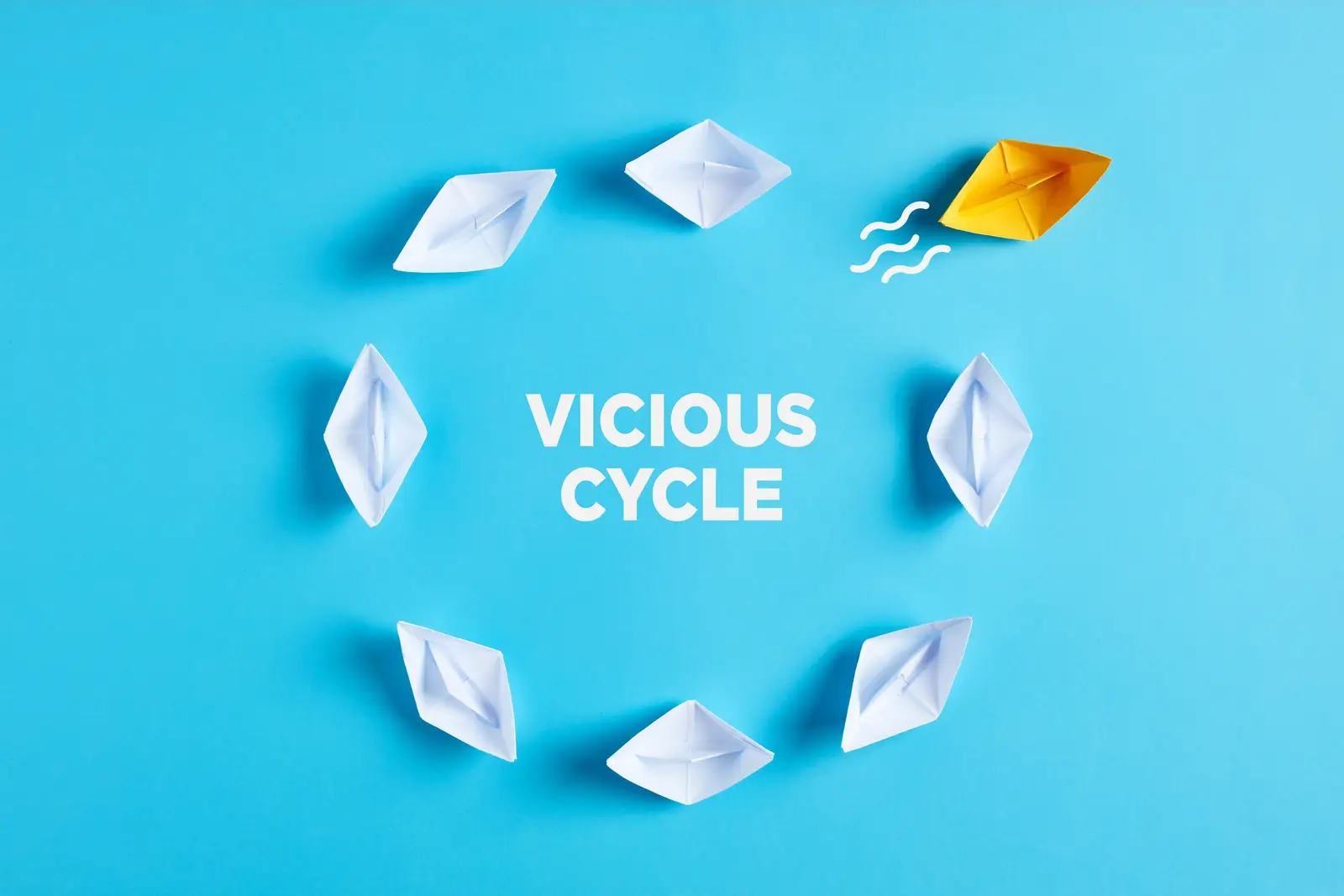Have you ever caught yourself repeating the same organisational struggles with your child that you experienced growing up? For parents with ADHD raising children who share the diagnosis, this sense of déjà vu can be both frustrating and illuminating. With ADHD heritability rates reaching up to 88%, the generational pattern is far from coincidental—but it doesn't have to be destiny.
Breaking the cycle of generational ADHD is less about eliminating a neurological condition that's hardwired into your family's DNA, and more about creating new patterns that work with your shared neurotype rather than against it.
In this guide, you'll discover:
- Practical strategies specifically designed for parents with ADHD raising ADHD children
- How addressing your own ADHD can dramatically improve your child's outcomes
- Evidence-based approaches to create family systems that accommodate everyone's executive functioning needs
Let’s begin!
Understanding the Hereditary Nature of ADHD
When you look at your child's ADHD behaviors and recognize yourself, it's not just perception—it's genetics at work. ADHD has one of the strongest genetic components among all neurodevelopmental disorders, with science consistently confirming what many families experience firsthand.
Twin studies demonstrate the powerful role genetics plays in ADHD, with heritability estimates ranging from 74% to 88%. This means that genetic factors account for the vast majority of ADHD risk transmission across generations. Children with ADHD are nearly eight times more likely to have a parent with ADHD, creating family patterns that can span multiple generations.
Research has identified dozens of candidate genes linked to ADHD, many affecting dopamine regulation in the brain. These genetic factors create a neurological foundation that shapes how both you and your child experience the world, from attention challenges to differences in time perception.
Understanding this biological connection is crucial because it:
- Removes blame and shame from parenting struggles
- Helps explain why certain strategies that work for neurotypical families may fail in yours
- Provides a foundation for developing approaches that work with your shared neurological profile
Rather than viewing this hereditary link as a sentence, consider it valuable information that can guide more effective parenting approaches tailored to your family's unique neurological makeup.

The Double Challenge: Parenting with ADHD When Your Child Has It Too
Raising a child is demanding for anyone, but when both parent and child have ADHD, the challenges multiply in unique ways. This "double ADHD" dynamic creates situations where the very executive function skills needed to help your child are the same ones you may struggle with yourself.

Common Struggles for Parents with ADHD
Parents with ADHD often face a particular set of challenges that can complicate the already demanding job of parenting. These difficulties extend beyond typical parenting struggles and can create frustrating cycles if not adequately addressed.
Many parents with ADHD find themselves struggling with:
- Maintaining consistent routines and structure — When you have difficulty tracking time and transitions yourself, creating predictable daily patterns for your child becomes doubly difficult
- Organization and time management — From misplaced permission slips to chronically running late, the organizational demands of parenting can overwhelm an ADHD brain
- Emotional dysregulation affecting interactions — When both you and your child have emotional regulation challenges, conflicts can quickly escalate
- Increased parental stress and inadequacy feelings — The constant struggle to meet neurotypical parenting expectations can lead to burnout and self-doubt
- Following through with behavior management — Consistently applying consequences or rewards requires the very executive functioning skills that ADHD affects
These challenges don't make you a bad parent—they simply reflect the reality of navigating parenting with a brain wired differently from what most parenting advice assumes.

How Parental ADHD Impacts Child Development
The relationship between a parent's ADHD symptoms and their child's development creates a complex feedback loop that can either amplify challenges or, when properly managed, create opportunities for shared understanding and growth.
Research shows that untreated parental ADHD can significantly impact a child's development in several ways:
- Inconsistent discipline can inadvertently worsen a child's ADHD symptoms, as unpredictable responses make it harder for children to internalize behavioral expectations
- Higher parental ADHD symptoms correlate with more negative parenting practices, including increased criticism and decreased positive reinforcement
- Untreated parental ADHD can reduce the effectiveness of a child's ADHD treatment, as parents may struggle to implement and maintain therapeutic strategies
- Parents with ADHD may find it challenging to model the executive functioning skills their children need to develop, such as organization, emotional regulation, and time management
Understanding these impacts isn't about assigning blame but recognizing the importance of addressing both your needs and your child's simultaneously. When you take steps to manage your own ADHD effectively, you create a foundation for better supporting your child's development.

Breaking the Cycle: Strategies for Parents with ADHD
Breaking generational patterns requires a two-pronged approach: addressing your own ADHD needs while simultaneously creating systems that support your child. This dual focus creates positive momentum that can transform family dynamics and interrupt negative cycles.

Addressing Your Own ADHD First
Before you can effectively help your child navigate their ADHD challenges, it's essential to address your own symptoms and develop personal management strategies. Don’t think of this as selfish: it's the foundation for breaking generational patterns.
Start with these concrete steps:
- Seek proper diagnosis and treatment for yourself — If you've been managing undiagnosed ADHD, consider a comprehensive assessment to understand your specific ADHD profile. ADHD Specialist offers a thorough assessment process that provides adults with a clear understanding of their symptoms and how they might be affecting parenting abilities.
- Explore medication options — For many adults with ADHD, medication provides the neurological support needed to implement other management strategies effectively. Consider discussing medication options with a specialist who understands adult ADHD.
- Develop personalised coping strategies — Work with an ADHD-informed therapist to develop specific techniques for your challenge areas. For example, if emotional regulation is difficult, learn techniques like the "STOP" method (Stop, Take a breath, Observe, Proceed) to use before responding to triggering situations with your child.
- Practice radical self-compassion — Replace self-criticism ("I should be better at this") with self-compassion ("I'm doing my best with a brain that works differently"). This shift not only helps you but also models healthy self-talk for your child.
By prioritizing your own ADHD management, you're not being selfish—you're creating the necessary foundation to break generational patterns and provide more consistent support for your child.

Creating ADHD-Friendly Family Systems
One of the most powerful ways to break the cycle of generational ADHD is to create family systems and routines that work with, rather than against, ADHD brains. These systems benefit both you and your child by providing the external structure that ADHD brains often need.
Here's how to build ADHD-friendly systems that work:
- Establish visual routine frameworks — Create physical morning and evening routine charts that both you and your child can reference. For example, a morning routine board with removable picture cards showing each step (wake up, brush teeth, get dressed, eat breakfast, pack bag, leave) provides visual cues that reduce the need for working memory.
- Use shared organisational tools — Implement a family calendar system that's visible to everyone. A large wall calendar with color-coding for different family members makes time more concrete and helps everyone see upcoming transitions.
- Create transition rituals — Transitions are often challenging for ADHD brains. Develop consistent cues that signal upcoming changes, like a special song that plays five minutes before leaving the house or a specific phrase that indicates homework time is approaching.
- Design ADHD-friendly spaces — Modify your home environment to reduce distractions and support focus. For example, create homework stations with noise-canceling headphones, fidget tools, and visual timers to make focus periods more manageable.
- Implement "body doubling" — Work alongside your child during challenging tasks. For instance, sit at the table and do your own paperwork while they do homework, providing the motivational boost that comes from working in parallel.
These systems work because they externalize the executive functions that both you and your child find challenging, creating a supportive structure that doesn't rely on memory, motivation, or internal time awareness.

Positive Parenting Approaches for ADHD Families
The traditional parenting approaches that work for neurotypical families often fall short when both parent and child have ADHD. Developing ADHD-informed parenting strategies can transform daily interactions and foster stronger, more supportive relationships.
Try these ADHD-specific parenting techniques:
- Focus on positive reinforcement — ADHD brains are particularly sensitive to rewards. Create a "caught being good" system where you actively look for and immediately acknowledge positive behaviors, no matter how small. Be specific: "I noticed you put your shoes away without being reminded—that really helps our morning go smoothly!"
- Use brief, clear instructions — When giving directions, make them concise and action-oriented. Instead of "Can you please clean up your room soon? It's really messy and we need to get going," try "Please put your toys in the bin now. We're leaving in 10 minutes."
- Break tasks into manageable steps — Large tasks can overwhelm ADHD brains. For bedtime, instead of saying "Get ready for bed," break it down: "First, put on pajamas. Then brush your teeth. Then choose one book." Create visual checklists for recurring multi-step processes.
- Practice co-regulation techniques — When emotions run high, use paired breathing or counting exercises to calm down together. For example, sit face-to-face and take five deep breaths in unison before addressing a conflict.
- Celebrate small wins together — ADHD often comes with rejection sensitivity and negative self-perception. Create a daily "wins jar" where both you and your child write down small successes and read them together on a weekly basis.
Parents struggling with implementing consistent behavior management strategies might benefit from ADHD Specialist's personalised therapy and coaching services, which can help develop tailored approaches that work with—not against—your unique ADHD traits.

Treatment Approaches for Families with Generational ADHD
When ADHD affects multiple generations in a family, comprehensive treatment approaches that address both parent and child needs are essential for breaking negative cycles. The right combination of interventions can create positive momentum that benefits the entire family system.
Medication Considerations
Medication often plays a vital role in managing ADHD symptoms for both parents and children, but coordinating treatment requires thoughtful planning and monitoring.
Here are key medication considerations for families with generational ADHD:
- Understanding age-specific medication responses — Medication affects children and adults differently. While stimulants are effective for both age groups, dosing, timing, and side effect profiles may vary significantly. For example, adults often require longer-acting formulations to meet the demands of their workday.
- Coordinating medication schedules — When multiple family members take ADHD medication, creating a synchronized system prevents missed doses. Consider using a shared medication tracking app or a centralized pill organizer with designated morning and evening sections for each family member.
- Managing and monitoring side effects — Create a simple tracking system to note side effects for all family members. This might include a shared journal where changes in appetite, sleep issues, or mood effects are noted, helping to identify patterns that need addressing.
- Working with coordinated healthcare providers — Ideally, find providers who can communicate with each other about family treatment plans. If you're navigating medication decisions for yourself or your child, ADHD Specialist offers medication prescribing services that take into account the full family context.
Effective medication management can lay a foundation that enables other interventions to be more successful, as improved focus and reduced impulsivity allow both parents and children to implement behavioral strategies more consistently.

Therapy Options for ADHD Families
Various therapy approaches can help address the unique dynamics of families where both parents and children have ADHD. The proper therapeutic support provides tools for better communication, emotional regulation, and family functioning.
Consider these therapy options specifically beneficial for ADHD families:
- Family therapy with ADHD focus — Look for family therapists with specific ADHD expertise who can address the unique dynamics of multi-generational ADHD. These specialists can help identify how ADHD symptoms create family patterns and develop strategies to interrupt negative cycles.
- Modified parent training programs — Standard parent training programs often assume it’s neurotypical parents implementing strategies for ADHD children. Seek programs specifically adapted for parents with ADHD, which include modifications like visual reminders, simplified step-by-step approaches, and accountability structures.
- Cognitive-behavioral therapy (CBT) for both generations — CBT helps identify and change negative thought patterns and behaviors. When both parent and child learn these techniques, they can support each other in practicing new skills and recognizing unhelpful thinking patterns.
- Group therapy options — Parent-child groups specifically for families with generational ADHD provide both support and practical strategies. These groups normalize experiences and create opportunities to learn from other families facing similar challenges.
Effective therapy doesn't just address symptoms—it helps transform family dynamics by improving communication, reducing conflict, and building skills that support better functioning for everyone.

Building Support Networks
No family exists in isolation, and this is especially true for families managing generational ADHD. Creating a robust support network provides resources, understanding, and practical help that makes breaking cycles possible.
Here's how to build an effective support system:
- Find ADHD-informed childcare and educational support — Seek childcare providers and teachers who understand ADHD and can implement consistent strategies. Provide them with specific information about what works for your child, such as transition warnings or movement breaks.
- Connect with other ADHD families — Join in-person or online support groups specifically for parents with ADHD who have ADHD children. These communities provide understanding, practical tips, and the relief of knowing you're not alone in your struggles.
- Utilise community resources — Research local resources like ADHD coaching programs, specialized summer camps, or after-school programs designed for children with ADHD. These structured environments can provide valuable support and skill-building opportunities.
- Develop a professional support team — Assemble healthcare providers who understand family ADHD dynamics. This might include a psychiatrist for medication management, therapists for behavioral support, and educational advocates to help navigate school accommodations.
A strong support network creates a community of understanding that reduces the isolation many ADHD families experience. Better yet, it offers models for different ways of approaching shared challenges.

The Role of Genetic Testing in Understanding Family ADHD Patterns
Genetic testing is becoming an increasingly valuable tool for families affected by ADHD across generations. While not yet standard practice, it can provide insights into specific genetic factors that may be linked with your specific metabolism and certain medications response.
Genetic testing for ADHD typically involves analyzing DNA samples to identify specific ensymes responsible to metabolise medication. The process usually involves a simple cheek swab or saliva sample, making it non-invasive and accessible.
Understanding your family's specific genetic profile offers several potential benefits:
- Personalised treatment approaches — Genetic information can help predict how individuals might respond to different medications or behavioral interventions, potentially reducing the trial-and-error process often involved in ADHD treatment.
- Managing related conditions — Genetic testing might reveal additional information for treatment options for conditions that commonly co-occur with ADHD, such as anxiety disorders or depression, allowing for more comprehensive treatment planning.
However, it's important to understand the current limitations of genetic testing for ADHD:
- The field is still evolving, and tests may not capture all factors involved
- Results suggest treatments better suited to your metabolism, not definitive answers.
- Environmental factors still play an essential role in how genes are expressed
- Testing can be costly and may require to be self-funded
- Genetic testing is not a diagnostic tool.
For families interested in exploring the genetic components of their ADHD, ADHD Specialist offers ADHD assessment with genetic testing that can provide valuable insights into a more personalised treatment approaches.

Looking Forward: Building Resilience in ADHD Families
The goal for families with generational ADHD isn't to eliminate a neurological condition that's hardwired into your DNA. Instead, focus on building resilience and creating environments where both parents and children can thrive with their unique brain wiring.
Building resilience in ADHD families involves several key approaches:
- Reframing ADHD as a difference, not just a disorder — Help your child understand that ADHD brains have strengths as well as challenges. Discuss famous successful people with ADHD and highlight how certain ADHD traits—like creativity, hyperfocus, and out-of-the-box thinking—can be advantages in the right contexts.
- Identifying and leveraging ADHD strengths — Take time to identify specific strengths in each family member. Perhaps your child shows exceptional creativity or your own ADHD gives you high energy and enthusiasm. Create opportunities to showcase and develop these strengths rather than focusing exclusively on challenges.
- Teaching self-advocacy skills — As your child grows, help them understand their own needs and how to communicate them effectively. Practice scripts for requesting accommodations or explaining their learning style to teachers. This skill becomes increasingly important as they move toward independence.
- Planning for transitions and future challenges — ADHD families often struggle with transitions, whether it's the daily transition from school to home or larger life transitions like changing schools. Create transition plans that include extra support, visual schedules, and clear expectations to reduce anxiety and confusion.
- Creating lasting positive family dynamics — Focus on building positive connections that aren't centered around ADHD management. Schedule regular "special time" with each child that follows their interests and creates positive associations. These relationship investments build resilience that helps weather the inevitable challenging moments.
Remember that resilience isn't about never struggling—it's about having the tools, support, and mindset to bounce back from difficulties. By consistently implementing these approaches, you can help your family develop the resilience needed to thrive despite the challenges of generational ADHD.

The Parallel Processing Advantage: A Unique Strength in ADHD Families
One unique aspect rarely discussed in mainstream ADHD resources is what we might call the "Parallel Processing Advantage" that can emerge in families where both parents and children have ADHD. While much focus is placed on the challenges of generational ADHD, this phenomenon represents a potential strength worth exploring and leveraging.
In families where multiple members have ADHD, there often develops a unique form of neurological synchronicity—parents and children who process information in similar ways can develop intuitive communication patterns that neurotypical families may not experience. This shared neurological experience creates opportunities for deeper understanding and connection.
For example, a parent with ADHD may instinctively understand their child's difficulty transitioning between activities not just intellectually, but experientially. This shared experience can lead to more effective, empathetic problem-solving approaches that work with their shared neurotype rather than against it.
Research from the field of neurodiversity suggests that when parents embrace their own ADHD traits while guiding their children, they can create what psychologists call "cognitive resonance"—a state where similar thinking styles actually enhance communication rather than impede it. This represents a significant shift from viewing generational ADHD solely as a liability.
To leverage this parallel processing advantage:
- Share your own ADHD experiences — When appropriate, discuss your own challenges and solutions with your child. This normalizes their experience and creates a problem-solving partnership.
- Co-create strategies — Rather than imposing systems, work together to develop approaches that make sense to both your ADHD brains. The solutions you create together will likely be more intuitive and sustainable.
- Celebrate shared strengths — Identify ADHD traits that run in your family that can be positive, like creativity, enthusiasm, or empathy. Create opportunities to use these shared strengths in family activities.
- Develop your own "ADHD language" — Many ADHD families develop shorthand terms or signals that help navigate everyday challenges. These might include code words for when someone needs a break or reminders that align with your shared thinking style.
By recognizing and leveraging this parallel processing advantage, you can transform what might seem like a double challenge into a unique opportunity for connection and understanding.

Ready to Break the Cycle? Start Here
Breaking the cycle of generational ADHD isn't about eliminating ADHD itself—it's about creating new patterns that work with your family's unique neurological profile. With the right strategies, support, and mindset, you can transform shared challenges into opportunities for growth and connection.
The journey to breaking generational ADHD cycles starts with understanding, continues with practical strategies, and leads to a family dynamic where ADHD is managed effectively rather than perpetuating struggles across generations.
- Start with understanding your own ADHD. Book a comprehensive 2.5-hour ADHD assessment with ADHD Specialist to gain clarity about your specific ADHD profile and how it affects your parenting.
- Create external systems that support both you and your child. Implement visual schedules, environmental modifications, and consistent routines that reduce the executive function demands on everyone.
- Build a coordinated treatment approach. Consider how medication, therapy, and coaching can work together to support both the parent's and child's needs, potentially including ADHD Specialist's medication prescribing services that take the whole family context into account.
- Leverage the unique understanding that comes from shared experiences. Your firsthand knowledge of ADHD challenges can become your greatest parenting asset when channelled into empathy and practical solutions.
P.S. If you're ready to transform your family's ADHD experience, ADHD Specialist offers comprehensive assessment, personalised treatment, and ongoing support for families in London and across the UK to break negative cycles and create positive new patterns that work for your unique family.
References
Trapped in the ADHD Drama Triangle? How to Break Free
Private ADHD Assessment London | Adults & Teens (16+) | UK
ADHD Specialist - ADHD Therapy & Coaching London and UK.
Controlled drug (CD) Prescriptions for ADHD, London and U.K.
ADHD Assessment with Genetic Testing | ADHD Specialist
Genetics of attention deficit hyperactivity disorder | Molecular Psychiatry
Dopaminergic System Genes in ADHD: Toward a Biological Hypothesis | Neuropsychopharmacology
Intergenerational transmission of ADHD behaviors: genetic and environmental pathways - PubMed
Disclaimer: The information is not intended nor implied to be a substitute for professional medical advice, diagnosis or treatment. All content, and information, contained in this article is for general information purposes only and does not replace a consultation with your own doctor/health professional. Information about mental health topics and treatments can change rapidly and we cannot guarantee the content's currentness. For the most up-to-date information, please consult your doctor or qualified healthcare professional. For more information, you can check the Royal College of Psychiatrists (rcpsych.ac.uk)
Pictures source Pexels.com Shutterstock.com Free Stock Photos, Royalty Free Stock Images & Copyright Free Pictures · Pexels ; Stock Images, Photos, Vectors, Video, and Music | Shutterstock
.svg)
.svg)





.svg)






